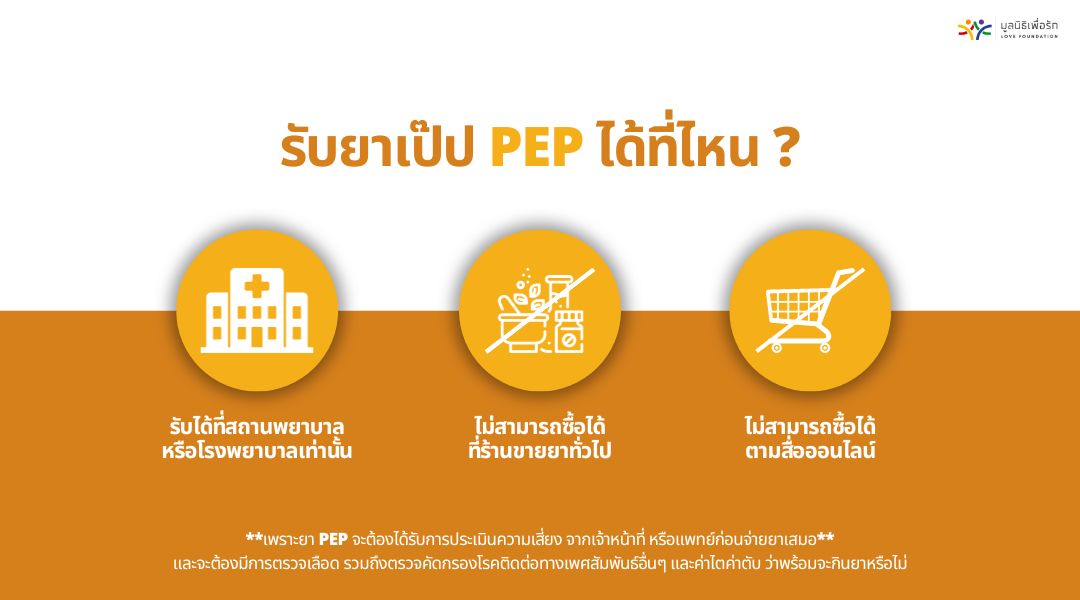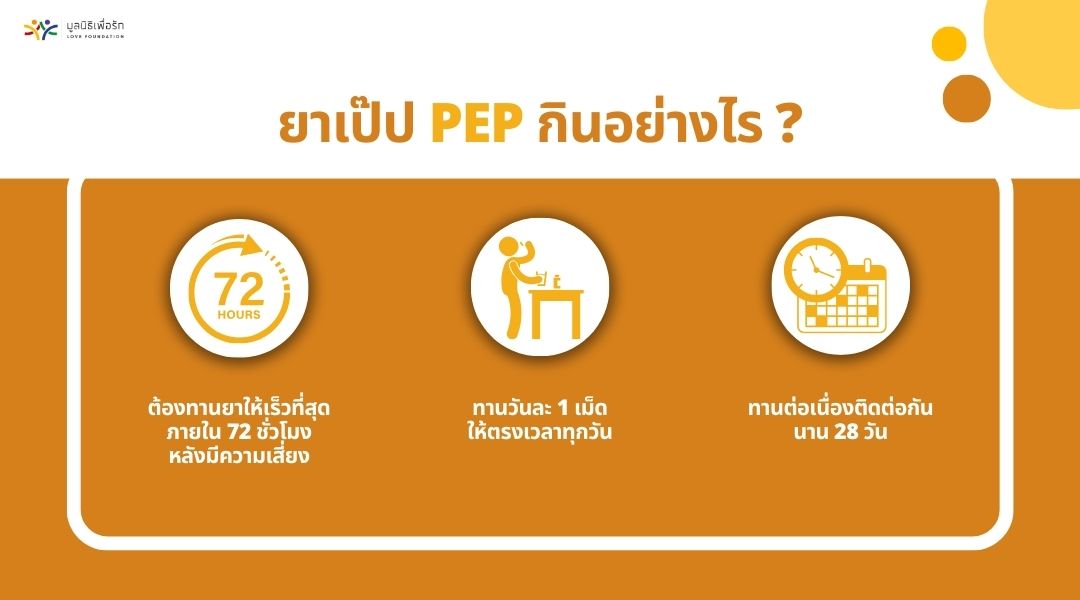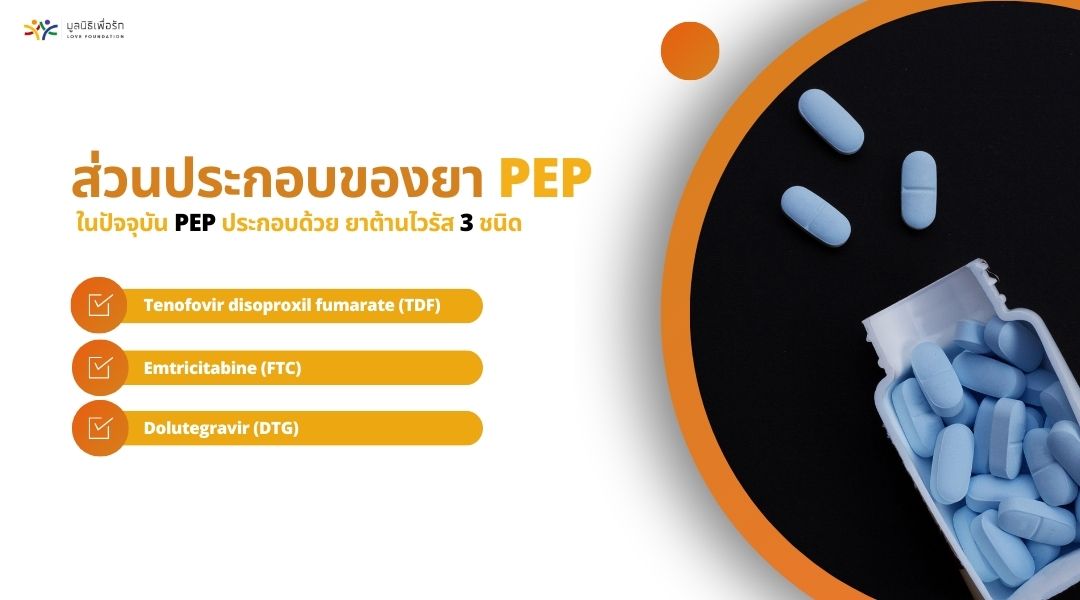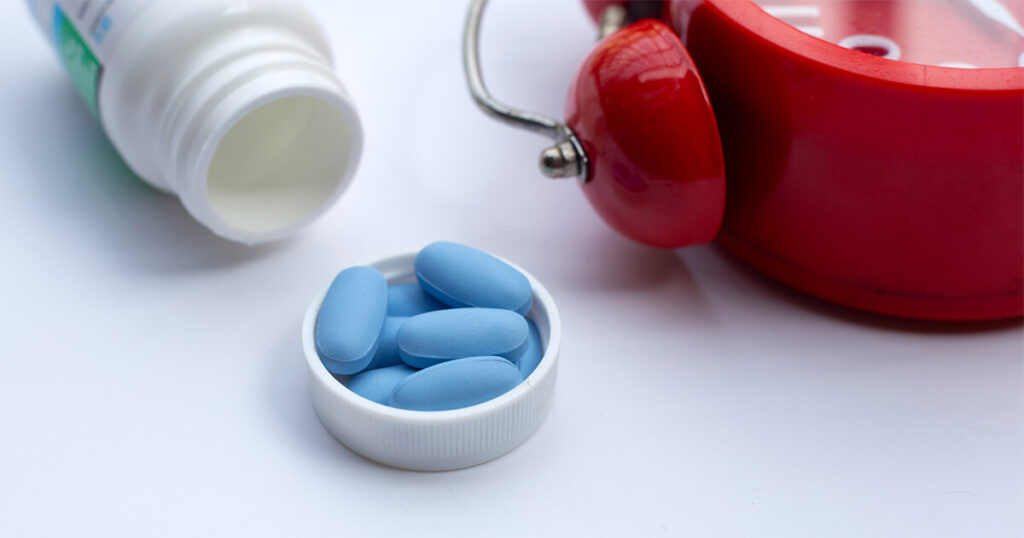แท้จริงแล้ว ยาเป๊ป (PEP) คืออะไร ยาชนิดนี้เรียกสั้นๆ ว่ายาต้านฉุกเฉินเป็นยาต้านเชื้อไวรัสเอชไอวีที่ใช้ในกรณีฉุกเฉินเท่านั้น! ชื่อเต็มของยาเป๊ป ย่อมาจากคำว่า Post-Exposure Prophylaxis เป็นตัวยาที่ใช้ทานป้องกันหลังมีความเสี่ยงที่ไม่ได้ตั้งใจ หรือมีอุบัติเหตุฉุกเฉินที่มีโอกาสได้รับเชื้อเอชไอวี ซึ่งก่อนที่จะทานยาชนิดนี้ จะต้องได้รับการตรวจเลือดว่าไม่ได้เป็นผู้ติดเชื้อเอชไอวีอยู่ก่อน จึงจะทานยาได้ และต้องทานยาเป๊ปให้เร็วที่สุด ภายใน 72 ชั่วโมง จึงจะสามารถช่วยป้องกันไม่ให้ติดเชื้อได้
ความเสี่ยงใดบ้างที่ควรทานยา PEP
- ผู้มีเพศสัมพันธ์โดยที่ไม่ได้ป้องกัน ไม่ใช้ถุงยางอนามัย
- เกิดอุบัติเหตุระหว่างมีเพศสัมพันธ์ เช่น ถุงยางอนามัยฉีกขาด รั่ว หรือหลุดออก
- ผู้ที่ถูกล่วงละเมิดทางเพศ ถูกข่มขืน หรือมีเพศสัมพันธ์โดยไม่ได้ตั้งใจ
- ผู้ที่ใช้เข็มฉีดยา สารเสพติดที่ใช้เข็มร่วมกับผู้อื่น
- เจ้าหน้าที่การแพทย์ที่ถูกเข็มทิ่มตำ มีดผ่าตัดบาด หรือสัมผัสเลือดของผู้ติดเชื้อ
รับยาเป๊ป PEP ได้ที่ไหน

การรับยาเป๊ป จะต้องติดต่อสถานพยาบาล หรือโรงพยาบาลเท่านั้น ไม่สามารถซื้อได้ที่ร้านขายยาทั่วไป หรือตามสื่อออนไลน์ได้ เพราะยาต้านเชื้อไวรัสเอชไอวีฉุกเฉินนี้ จะต้องได้รับการประเมินความเสี่ยง จากเจ้าหน้าที่ หรือแพทย์ก่อนจ่ายยาเสมอ อีกทั้งยังต้องมีการ ตรวจเลือดหาเชื้อเอชไอวี และอื่นๆ ด้วย หลังทานยาหมด ควรกลับไปที่สถานพยาบาลเดิมเพื่อทำการตรวจเลือดอีกครั้ง
ขั้นตอนการรับยาเป๊ป
เมื่อติดต่อสถานพยาบาล หรือโรงพยาบาลเรียบร้อยแล้ว โดยแจ้งเจ้าหน้าที่ว่ามีความเสี่ยง ต้องการรับยาเป๊ปที่ต้องทานภายใน 72 ชั่วโมง เจ้าหน้าที่จะดำเนินการให้เข้าพบแพทย์ เพื่อสอบถามสถานการณ์ความเสี่ยง รวมทั้งปรึกษาประเมินความเสี่ยงก่อน หากแพทย์ เห็นว่าคุณควรได้รับยาเป๊ปจริง แพทย์จะสั่งตรวจเลือดเอชไอวีก่อน หากทราบผลว่าไม่ติดเชื้อ จึงจะสามารถใช้ยานี้ได้
รวมทั้งการตรวจคัดกรองโรคติดต่อทางเพศสัมพันธ์อื่นๆ และสุขภาพของผู้ที่มีความเสี่ยงด้วย ว่าสามารถทานยาเป๊ปได้ หรือไม่ เสี่ยงต่อผลข้างเคียงใดๆ หรือเปล่า จากนั้นแพทย์จะเลือกตัวยาที่เหมาะสมให้กับคุณ แนะนำวิธีการทานยาอย่างละเอียด ก่อนจ่ายยาให้คุณนำกลับไปทาน โดยในขั้นตอนนี้ขอให้คุณตั้งใจฟังรายละเอียดทั้งหมดที่แพทย์แจ้งเพื่อผลประโยชน์ ในการทานยาเป๊ป อย่างมีประสิทธิภาพของคุณเอง
ยาเป๊ป (PEP) ทำงานอย่างไร
ยาเป๊ป มีส่วนผสมของยาต้านไวรัสเอชไอวี ประกอบไปด้วยตัวยา 2 – 3 ชนิด ขึ้นอยู่กับแพทย์จะพิจารณาเลือกสูตรยาเป๊ป ชนิดไหนให้คุณทาน โดยตัวยาจะเข้าไปช่วยยับยั้งการแบ่งตัว ของสารพันธุกรรมในเชื้อไวรัสเอชไอวี และยับยั้งการกลายเป็นตัวไวรัสที่สมบูรณ์ ซึ่งจะทำให้ร่างกายสร้างระบบภูมิคุ้มกันในการป้องกันก่อนจะแพร่กระจายได้ ดังนั้นจึงควรทานยาเป๊ปให้เร็วที่สุด และต้องไม่เกิน 72 ชั่วโมง ภายหลังจากมีความเสี่ยง และทานต่อเนื่องไปอีก 28 วัน เพื่อให้ยามีประสิทธิภาพในการรักษาได้สูงสุด
ยาเป๊ป (PEP) กินอย่างไร

ยาเป๊ป ถือเป็นยาที่ควรให้ความใส่ใจ และมีวินัยในการทานยาอย่างเคร่งครัด การทานยาให้ตรงต่อเวลาเป็นประจำทุกวัน จนกว่าจะครบกำหนดที่ 28 วัน ถือเป็นสิ่งที่จะช่วยให้ประสิทธิภาพของการป้องกันเชื้อเอชไอวีได้ผลดี หากลืมทานยาเป๊ป ให้ทานทันทีตอนที่คุณนึกขึ้นได้ และทานยาเวลาเดิมในวันถัดไป อาจเลือกใช้นาฬิกาปลุก หรือตั้งเตือนจากโทรศัพท์มือถือ เพื่อให้คุณไม่พลาดการทานยา ระหว่างที่กำลังทานยาเป๊ปอยู่ควรงดเว้นการมีเพศสัมพันธ์ไปก่อน หรือหากจำเป็นจริงๆ ต้องอย่าลืมใช้ถุงยางอนามัยทุกครั้ง
ข้อควรปฏิบัติระหว่างทานยาเป๊ป (PEP)
- ในระหว่างที่ทานยาเป๊ปอยู่นั้น ควรมีวินัยในการทานยาตามขนาดที่แพทย์สั่ง ทุกวันอย่างสม่ำเสมอจนครบกำหนด 28 วัน และไปพบแพทย์ตามนัดทุกครั้ง
- คำนึงถึงการทานยาที่ตรงเวลาเสมอ ผู้ที่ทานยาเป๊ปสามารถเลือกเวลาไหนก็ได้ตามสะดวก แต่ควรเป็นเวลาเดียวกันทุกวัน หรือเป็นเวลาที่แพทย์แนะนำให้เริ่มทานในเม็ดแรกทุกวัน ระยะห่างระหว่างยาแต่ละมื้อ ต้องมีความแม่นยำ และเหมือนกันทุกวัน เพื่อไม่เปิดโอกาสให้เชื้อเอชไอวีที่คาดว่าจะได้รับจากความเสี่ยงครั้งนี้ พัฒนาตนเองมาดื้อยาได้ และสามารถควบคุมเชื้อเอชไอวีได้ตลอดเวลา เพราะระดับยาในเลือดคงที่เท่ากันในทุกๆ วันของช่วงระยะเวลาทานยาเป๊ปนั่นเอง
- ผู้ที่ทานยาเป๊ปอยู่นั้น ควรงดดื่มเครื่องดื่มที่มีแอลกอฮอล์ งดการสูบบุหรี่ และยาเสพติด เพราะจะทำลายสุขภาพร่างกายอ่อนแอ ง่ายต่อการแทรกซ้อนของโรค
- ควรเก็บยาในที่แห้ง อุณหภูมิปกติ และไม่ถูกแสงแดด ไม่เก็บไว้ในรถยนต์ส่วนตัวที่จอดตากแดดทิ้งไว้นานๆ รวมทั้งต้องเก็บให้พ้นจากมือเด็ก
- หากรู้สึกถึงความผิดปกติใดๆ ในร่างกายให้รีบปรึกษาแพทย์ให้เร็วที่สุด
- ควรหลีกเลี่ยงการรับประทานสมุนไพร อาหารเสริม และยานอกเหนือจากที่รับจากโรงพยาบาล หรือสถานพยาบาล หากต้องการทานจริงๆ ควรปรึกษาแพทย์ก่อนเสมอ หรือรอให้พ้นช่วงระยะเวลาในการทานยาเป๊ป ผ่านไปก่อนสักระยะ
- ไม่ควรอยู่ในบริเวณ หรือสถานที่แออัด หรือเสี่ยงต่อการติดเชื้อ
- ไม่ควรเสี่ยงรับเชื้อเพิ่ม ในระหว่างที่ทานยาเป๊ปอยู่ หากต้องการมีเพศสัมพันธ์ควรป้องกันด้วยการใช้ถุงยางอนามัย และมีสติในการใช้ชีวิต ไม่ควรประมาท
ผลข้างเคียงของยาเป๊ป (PEP)
ยาเป๊ป อาจมีผลข้างเคียงเล็กน้อย เช่น ปวดศีรษะ ท้องเสีย คลื่นไส้ อาเจียน โดยอาการเหล่านี้จะเกิดขึ้นในระยะแรกที่เริ่มทานยา และสามารถหายไปได้เอง แต่หากมีอาการรุนแรงควรปรึกษาแพทย์ทันที ขณะที่มีการวิจัยระบุว่าการทานยาเป๊ปนั้น มีประสิทธิภาพใน การป้องกันมากกว่า 90% แต่ก็มีในบางรายที่ล้มเหลว ซึ่งเกิดจากการได้รับยาเป๊ป ช้าเกินกว่าเวลาที่กำหนด (เกิน 72 ชั่วโมง) หรือระดับของเชื้อไวรัสเอชไอวี ที่ได้รับมามีปริมาณสูงมาก หรืออาจเป็นทั้งสองกรณีรวมกัน
ยาเป๊ป (PEP) ต่างจากยาเพร็พ (PrEP) อย่างไร
ง่ายๆ คือ ยาเป๊ป เป็นยาหลังเสี่ยง แต่ยาเพร็พ เป็นยาก่อนเสี่ยง นั่นเอง ยาเป๊ปใช้ทานในกรณีฉุกเฉิน เมื่อไม่ได้ใช้ถุงยางอนามัยป้องกัน หรือถุงยางอนามัยหลุด รั่ว ฉีกขาด ต้องกินต่อเนื่องเป็นเวลาประมาณหนึ่งเดือน แต่ยาเพร็พจะต้องมีการทานยามาสักระยะหนึ่งแล้ว และทาน ยาเพร็พ(PrEP) อย่างต่อเนื่องทุกวัน จึงจะสามารถป้องกันความเสี่ยงจากเชื้อเอชไอวีได้
ส่วนประกอบของยา PEP

ยาPEP ในปัจจุบัน ประกอบด้วย ยาต้านไวรัส 3 ชนิด ได้แก่
- Tenofovir disoproxil fumarate (TDF)
- Emtricitabine (FTC)
- Dolutegravir (DTG)
สรุป ข้อควรรู้เกี่ยวกับยา PEP
- ยาเป๊ป ใช้ในกรณีฉุกเฉินเท่านั้น ไม่แนะนำให้ทานเพื่อป้องกันเชื้อเอชไอวีทุกครั้ง หลังจากมีเพศสัมพันธ์ที่ไม่ปลอดภัย เพราะอาจส่งผลเสียต่อร่างกาย และเกิดการดื้อยาได้ในอนาคต
- ยาเป๊ป จะต้องทานภายใน 72 ชั่วโมง หรือ 3 วัน และทานต่อเนื่องไป 28 วัน โดยไม่ขาดยา
- ยาเป๊ป ใช้สำหรับผู้ที่ยังไม่ติดเชื้อเอชไอวี หรือมีผลเลือดลบ (-) เท่านั้น
- ยาเป๊ป ไม่ได้รับประกันว่าจะช่วยให้ไม่ติดเชื้อ 100% เป็นเพียงยาฉุกเฉินที่ช่วยป้องกันการแพร่กระจายเชื้อเอชไอวี และลดความเสี่ยงต่อการเกิดโรคเท่านั้น
- ยาเป๊ป มีผลข้างเคียงเพียงเล็กน้อย แต่หากรู้สึกมีอาการผิดปกติใดๆ ให้รีบปรึกษาแพทย์
- ยาเป๊ป หากลืมทานบ่อยๆ ขาดยาหลายวัน ให้รีบปรึกษาแพทย์ หรือในระหว่างทานห้ามหยุดยาเอง
- ยาเป๊ป หากทานหมดตามกำหนดแล้ว ควรกลับไปตรวจเลือดอีกครั้ง เพื่อเช็คว่าคุณไม่ติดเชื้อเอชไอวี
- ยาเป๊ป สามารถป้องกันเอชไอวีได้ แต่ไม่สามารถป้องกัน โรคติดต่อทางเพศสัมพันธ์อื่นๆ ได้
ถึงแม้ยาเป๊ป (PEP) จะช่วยในการป้องกันการติดเชื้อเอชไอวีได้ แต่ก็ไม่มีอะไรที่แน่นอน 100% ดังนั้น สิ่งสำคัญคือ การป้องกันตัวเอง ไม่ให้มีโอกาสรับเชื้อเพิ่มเติมระหว่างที่ทานยาต้านไวรัสฉุกเฉินอยู่ และควรใช้ถุงยางอนามัยทุกครั้งที่มีเพศสัมพันธ์ ไม่ควรใช้เข็มฉีดยาร่วมกับผู้อื่น และคำนึงถึงปัจจัยเสี่ยงที่อาจทำให้ติดเชื้อได้ เช่น การมีเพศสัมพันธ์ที่ขาดสติ มึนเมา การดื่มเครื่องดื่มแอลกอฮอล์ หรือใช้สารเสพติด เป็นต้น
